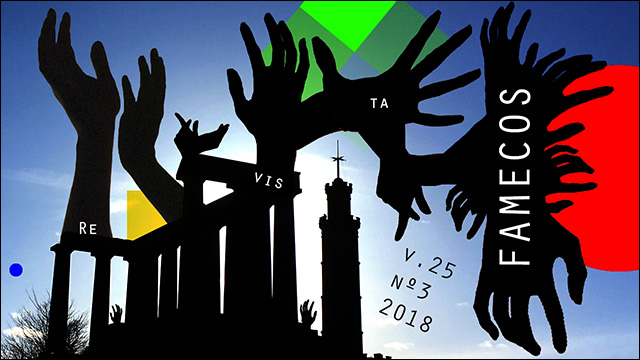Resonant heart: communication, affections and "mechanical" sociabilities in electronic music parties
DOI:
https://doi.org/10.15448/1980-3729.2018.3.29193Keywords:
Affects, Machines, SociabilityAbstract
This article explores ways of affecting and being affected in electronic music parties, and is based on Spinoza's ideas using the cartographic method for empirical research. Affects, machines and sociability are conceptual operators for the analysis of aspects of the communicational dimension of these parties. Affects are not limited to the subject's plan; they are flows of passage for various forms of expression and affectation, according to Deleuze & Guattari's perspective. Communication is seen as affect and flow from the perspectives of Morin, Beth & Pross and Marcondes Filho. We propose that media and communicative actions in such parties directly impact the bodies and alter the process of sociability; also, drawing on Latour, we argue that the affects are produced and potentialized through music and communication machines, which implies rethinking the concept of sociability to consider non-human participants as social actors.
Downloads
References
BATAILLE, Georges. A experiência interior. São Paulo: Editora Ática, 1992.
BETH, Hanno; PROSS, Harry. Introducción a la teoria de la comunicación. Barcelona: Anthropos, 1990.
CASSIRER, Ernst. Antropologia filosófica: ensaio sobre o homem – introdução a uma filosofia da cultura humana. São Paulo: Mestre Jou, 1977.
DELEUZE, Gilles. Cursos sobre Spinoza (Vincennes, 1978-1981). Fortaleza: EDUECE, 2009.
______; GUATTARI, Félix. Mil platôs – capitalismo e esquizofrenia 2. Vol.1. São Paulo: Editora 34,1995.
______. O anti-édipo: capitalismo e esquizofrenia 1. São Paulo: Ed. 34, 2010.
______. O que é a filosofia? Rio de Janeiro: Ed. 34, 1992.
DELEUZE, Gilles; MANGANARO, Jean-Paul. De Nietzsche à la Techno: Manifeste pour les machines-pensées à venir. Paris, 1998. par Richard Pinhas. Disponível em: http://www.webdeleuze.com/php/texte.php?cle=102&groupe=Bibliographie%20et%20mondes%20in%E9dits&langue=1. Acesso em: 2 fev. 2016
GILBERT, Jeremy; PEARSON, Ewan. Discographies – dance music, culture and politics of sound. New York: Routledge, 1999.
GUATTARI, Félix. O inconsciente maquínico – ensaios de esquizo-análise. Campinas, SP: Papirus, 1988.
LATOUR, Bruno. Reagregando o social – uma introdução à teoria do Ator-Rede. Salvador: Edufba, 2012; Bauru, São Paulo: Edusc, 2012.
MARCONDES FILHO, Ciro. FILHO, Ciro Marcondes (org.). Dicionário de Comunicação. São Paulo: Paulus, 2014, 2ª edição.
MERLEAU-PONTY, Maurice. Fenomenologia da percepção. São Paulo: Martins Fontes, 1945/2006.
MORIN, Edgar. O método 1 – a natureza da natureza. Porto Alegre: Sulina, 2008.
NEVES, Thiago T. Afeto. In: FILHO, Ciro Marcondes (org.). Dicionário de Comunicação. São Paulo: Paulus, 2014, 2ª edição.
NIETZSCHE, Friedrich Wilhelm. Assim falou Zaratustra. São Paulo: Editora Martin Claret, 1891/2007.
REYNOLDS, Simon. Generation Ecstasy – into the world of techno and rave culture. New York: Routledge, 1999.
SPINOZA. Ética. Belo Horizonte: Autêntica, 1677/2010.
SYLVAN, Robin. Trance formation – the spiritual and religious dimensions of global rave culture. New York: Routledge, 2005.
Downloads
Published
How to Cite
Issue
Section
License
Copyright
The submission of originals to Revista Famecos implies the transfer by the authors of the right for publication. Authors retain copyright and grant the journal right of first publication. If the authors wish to include the same data into another publication, they must cite Revista Famecos as the site of original publication.
Creative Commons License
Except where otherwise specified, material published in this journal is licensed under a Creative Commons Attribution 4.0 International license, which allows unrestricted use, distribution and reproduction in any medium, provided the original publication is correctly cited.






